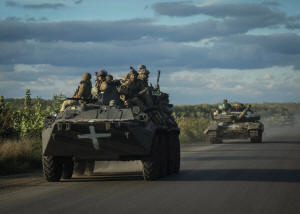Putin ally says he favours formally incorporating Ukrainian regions into
Russia
 Send a link to a friend
Send a link to a friend
 [September 20, 2022]
By Guy Faulconbridge and Pavel Polityuk [September 20, 2022]
By Guy Faulconbridge and Pavel Polityuk
LONDON/KYIV (Reuters) - One of Russian
President Vladimir Putin's top allies said on Tuesday he favoured
holding referendums in two eastern Ukrainian regions in order to
formally make them part of Russia, a move that would seriously escalate
Moscow's confrontation with the West.
The statement by Dmitry Medvedev, a former president who is currently
deputy chairman of the Security Council, marks a hardening of Russian
rhetoric on Ukraine and is the strongest sign yet that the Kremlin is
considering going ahead with a plan that Ukraine and the West have said
would be illegal.
He made his comments as Putin ponders his next steps in a nearly
seven-month-old conflict that has triggered the biggest confrontation
with the West since the 1962 Cuban Missile Crisis and after a
battlefield defeat in northeast Ukraine.
The leaders of the Russian-backed self-proclaimed Luhansk People's
Republic (LPR) and Donetsk People's Republic (DPR) a day earlier
discussed combining their efforts to hold referendums on joining Russia.

Officials in the Russian-controlled southern Kherson region on Tuesday
also requested a referendum on joining Russia.
Medvedev suggested that incorporating the LPR and DPR into Russia -
collectively known as the Donbas - would be an irreversible step once
completed. Anyone then attacking them would be assaulting Russia itself
which would, under its own law, be entitled to respond in self-defence.
"Encroachment onto Russian territory is a crime which allows you to use
all the forces of self–defence," Medvedev said in a post on Telegram.
"This is why these referendums are so feared in Kyiv and the West."
No future Russian leader be able to constitutionally reverse the outcome
of the votes, he wrote.
Washington and the West have so far been careful not to supply Ukraine
with weapons that could be used to shell Russian territory, and
Medvedev's interpretation of what de facto annexation would legally mean
from Moscow's point of view looked like a future warning to the West.
"They (the referendums) would completely change the vector of Russia's
development for decades. And not just of our country. The geopolitical
transformation of the world would be irreversible once the new
territories were incorporated into Russia," he wrote.
It is unclear how the referendums would be held given that Russian and
Russian-backed forces control only around 60% of the Donetsk region
while Ukrainian forces are trying to retake Luhansk.
Pro-Russian officials have previously said the referendums could be held
electronically and that everything was technically ready for them to go
ahead.
[to top of second column]
|

Ukrainian servicemen ride on Armoured
Personnel Carrier (APC) and a tank, as Russia's attack on Ukraine
continues, near the town of Izium, recently liberated by Ukrainian
Armed Forces, in Kharkiv region, Ukraine September 19, 2022.
REUTERS/Gleb Garanich

LUHANSK THRUST
Medvedev's comments came as Ukraine said its troops had retaken the
village of Bilohorivka in the Luhansk region and were preparing to
recapture all of the province which until now had been fully
occupied by Russian forces.
Unverified footage on social media showed Ukrainian forces in the
village, which is only 10 km (6 miles) west of the city of
Lysychansk, which fell to the Russians after weeks of grinding
battles in July.
"There will be fighting for every centimetre," Luhansk governor
Serhiy Gaidai wrote on Telegram. "The enemy is preparing their
defence. So we will not simply march in."
Russia named taking full control of Luhansk and the neighbouring
province of Donetsk as primary goals of what it called its "special
military operation" in Ukraine, alleging that Russian speakers there
were being persecuted and even shelled by Ukrainian government
forces, something Kyiv denied.
Ukrainian troops started to push into Luhansk after driving Russian
forces out of northeastern Kharkiv province in a lightning
counter-offensive this month.
"The occupiers are clearly in a panic," Ukrainian President
Volodymyr Zelenskiy said in a televised address late on Monday,
adding that he was now focused on "speed" in liberated areas.
"The speed at which our troops are moving. The speed in restoring
normal life," Zelenskiy said.
The Ukrainian leader also hinted he would use a video address to the
United Nations General Assembly on Wednesday to call on countries to
accelerate weapons and aid deliveries.
In the south, where another Ukrainian counter-offensive has been
making slower progress, Ukraine's armed forces said they had sunk a
barge carrying Russian troops and equipment across a river near Nova
Kakhovka in the Kherson region.

"Attempts to build a crossing failed to withstand fire from
Ukrainian forces and were halted. The barge ... became an addition
to the occupiers' submarine force," the military said in a
statement.
Reuters could not independently verify either side's battlefield
reports.
(Reporting by Reuters bureaus; Writing by Andrew Osborn ; Editing by
Angus MacSwan)
[© 2022 Thomson Reuters. All rights
reserved.]
This material may not be published,
broadcast, rewritten or redistributed.
Thompson Reuters is solely responsible for this content. |